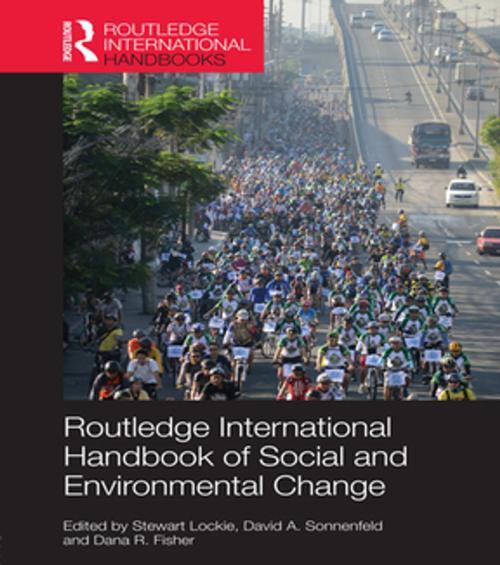Routledge International Handbook of Social and Environmental Change
Nonfiction, Science & Nature, Science, Biological Sciences, Ecology, Social & Cultural Studies, Social Science, Sociology| Author: | ISBN: | 9781136707988 | |
| Publisher: | Taylor and Francis | Publication: | October 30, 2013 |
| Imprint: | Routledge | Language: | English |
| Author: | |
| ISBN: | 9781136707988 |
| Publisher: | Taylor and Francis |
| Publication: | October 30, 2013 |
| Imprint: | Routledge |
| Language: | English |
Today, the risks associated with global environmental change and the dangers of extreme climatic and geological events remind us of humanity’s dependence on favourable environmental conditions. Our relationships with the landscapes and ecologies that we are a part of, the plants and animals that we share them with, and the natural resources that we extract, lie at the heart of contemporary social and political debates. It is no longer possible to understand key social scientific concerns without at the same time also understanding contemporary patterns of ecosystem change.
The Routledge International Handbook of Social and Environmental Change reviews the major ways in which social scientists are conceptualizing more integrated perspectives on society and nature, from the global to local levels. The chapters in this volume, by international experts from a variety of disciplines, explore the challenges, contradictions and consequences of social–ecological change, along with the uncertainties and governance dilemmas they create. The contributions are based around the themes of:
-
Climate change, energy, and adaptation
-
Urban environmental change and governance
-
Risk, uncertainty and social learning
-
(Re)assembling social-ecological systems
With case studies from sectors across both developed and developing worlds, the Handbook illustrates the inter-connectedness of ecosystem health, natural resource condition, livelihood security, social justice and development. It will be of interest for students and scholars across the social sciences and natural sciences, as well as to those interested and engaged in environmental policy at all levels.
Today, the risks associated with global environmental change and the dangers of extreme climatic and geological events remind us of humanity’s dependence on favourable environmental conditions. Our relationships with the landscapes and ecologies that we are a part of, the plants and animals that we share them with, and the natural resources that we extract, lie at the heart of contemporary social and political debates. It is no longer possible to understand key social scientific concerns without at the same time also understanding contemporary patterns of ecosystem change.
The Routledge International Handbook of Social and Environmental Change reviews the major ways in which social scientists are conceptualizing more integrated perspectives on society and nature, from the global to local levels. The chapters in this volume, by international experts from a variety of disciplines, explore the challenges, contradictions and consequences of social–ecological change, along with the uncertainties and governance dilemmas they create. The contributions are based around the themes of:
-
Climate change, energy, and adaptation
-
Urban environmental change and governance
-
Risk, uncertainty and social learning
-
(Re)assembling social-ecological systems
With case studies from sectors across both developed and developing worlds, the Handbook illustrates the inter-connectedness of ecosystem health, natural resource condition, livelihood security, social justice and development. It will be of interest for students and scholars across the social sciences and natural sciences, as well as to those interested and engaged in environmental policy at all levels.















